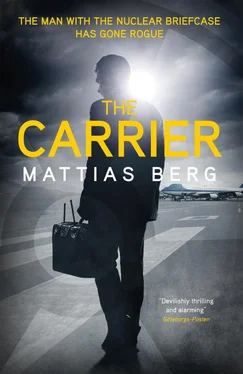Mattias Berg - The Carrier
Здесь есть возможность читать онлайн «Mattias Berg - The Carrier» весь текст электронной книги совершенно бесплатно (целиком полную версию без сокращений). В некоторых случаях можно слушать аудио, скачать через торрент в формате fb2 и присутствует краткое содержание. Город: London, Год выпуска: 2019, ISBN: 2019, Издательство: MacLehose Press, Жанр: Триллер, на английском языке. Описание произведения, (предисловие) а так же отзывы посетителей доступны на портале библиотеки ЛибКат.
- Название:The Carrier
- Автор:
- Издательство:MacLehose Press
- Жанр:
- Год:2019
- Город:London
- ISBN:978-0-85705-788-4
- Рейтинг книги:4 / 5. Голосов: 1
-
Избранное:Добавить в избранное
- Отзывы:
-
Ваша оценка:
- 80
- 1
- 2
- 3
- 4
- 5
The Carrier: краткое содержание, описание и аннотация
Предлагаем к чтению аннотацию, описание, краткое содержание или предисловие (зависит от того, что написал сам автор книги «The Carrier»). Если вы не нашли необходимую информацию о книге — напишите в комментариях, мы постараемся отыскать её.
The Carrier — читать онлайн бесплатно полную книгу (весь текст) целиком
Ниже представлен текст книги, разбитый по страницам. Система сохранения места последней прочитанной страницы, позволяет с удобством читать онлайн бесплатно книгу «The Carrier», без необходимости каждый раз заново искать на чём Вы остановились. Поставьте закладку, и сможете в любой момент перейти на страницу, на которой закончили чтение.
Интервал:
Закладка:
I gestured palms up, non-committally, so many incidents had occurred and I had no idea how much Aina knew—since Sixten had said that she expressly asked not to be kept informed of what we were doing. In case she got to hear anything at all about Ingrid’s crazy plan.
“And do you know what really annoys me, Erasmus?”
I shook my head. Felt Aina’s warmth, that paradoxically intense energy from this prim and proper person.
“That you Americans think you’re pretty special. As if the U.S. could never go the same way as so many other dominant powers in history, often when they’ve been spouting about freedom of expression and human rights or have been culturally the most prominent. France under Robespierre, the Soviet Union after the Revolution. I suppose I don’t have to say anything about Germany.
She reached for water.
“And if the worse comes to the worst, it won’t need much in your case either. One single mad ruler—for example that billionaire clown who the other day threatened to run in the next presidential elections. Imagine someone like that with his finger on the button.”
I held my hand over my glass to stop Aina from giving me a refill.
“Yet we can never know if a dangerous president represents a bigger risk that missiles will be fired off, if it couldn’t just as easily happen with the most reasonable ruler. Because the nuclear weapons system is a kind of regime in itself. Lives its own life, with or without safety measures, calculations.”
She paused, gave me an enquiring look. “You’re very quiet, Erasmus… don’t you agree?”
I met Aina’s eyes. How could I remind her that that was precisely why I now found myself here in her home in Ursvik—and not with my own family, on the other side of the Atlantic. But my direct look must have been enough.
“But of course you do, my God, how silly of me.”
Aina got up to start tidying things away, to make room for dessert. But Sixten gently ushered her back to her chair. Laid out side plates and cups, put the presents on the table in front of her, placed the princess cake in the middle of the tableau.
At that moment I clearly detected the smell of burning, perhaps even of gasoline, but thought it came from the candles which Sixten was lighting on the cake. Seventy of them neatly arranged in the green marzipan. The whole ritual took a while. First to light them, one at a time, with the elegant lighter which Sixten produced from the waistcoat of his dinner jacket. Then to let Aina have a total of five goes before she blew them all out.
Only after the applause died down did I hear the noise. The crackling sounded cozy, as if it came from a log fire—except that there was no fireplace in the house. It quickly grew to a roar, before the stench of fuel and smoke really hit us. When we came into the living room the blackout curtains were already in a burning heap on the floor, the discarded jerry can lying among them.
It took only a few seconds before the heat and the smoke became explosive. The modular construction of the house was as if designed for a pyromaniac: the flames spread through the rooms with lightning speed. I hoisted the hybrid onto my shoulders and drew my weapon. The Nurse came rushing out of the smaller bathroom as Sixten, with Aina tightly clutching his hand, led us through the smoke-filled hallway, where our outdoor gear was kept at the ready, toward the laundry room. More gasoline-soaked blackout curtains formed a ring of fire around the dryer and the drain in the floor. Effectively sealing off our only emergency escape route, down underground.
There was only one other way. Sixten rushed ahead up the stairs, the flames beginning to lick up the walls and the ceiling, in the direction of their bedroom. Unlatched the security locks, flung the window wide open and threw out the burning curtains—before jumping out with Aina held tight within his arms.
Then we threw ourselves after them. Straight out into the night.
3
First Down
October—December 2013
Kiruna, Sweden
3.01
It seemed as though the atomic winter had started just north of Gävle. The branches in the never-ending pine forest were weighed down to the ground with the constant snow, a fine powder which fell like radioactivity but was its exact opposite. The picture of innocent, virginal white.
So far from what fell over the Japanese fishermen after the tests at Bikini Atoll in 1954, covering both them and the catch in their nets. Just days later the disintegration of their organisms was in full progress. Bleeding from mouths and stomachs, then their hair fell out, long strips of skin came off their backs.
We passed Bollnäs, Ljusdal, kept heading north. At regular intervals I carefully raised the roller blind and looked out. It had stopped snowing, but the drifts were piled up against the platforms like solidified ocean waves, frozen and bewitched in mid-movement. Ånge at around midnight seemed enclosed in ice. The birches around the station looked silver-dipped, stiff with hoarfrost. We were being transported through a tunnel of deep winter. I tried in vain to sleep, that typical yellow station light filtering in under the blind. The squealing of the carriages as they were laboriously connected to or uncoupled from the train.
It could have been peaceful, graceful. As magical as the endless night trains of my childhood to my grandmother’s. My mother trying to teach me about the history of art, I her about cryptography. The aroma from her unconventional picnic, often some sort of Indian lentil stew with cumin and ginger, spread its way through the corridors where we spent the nights sitting on small fold-out seats, since neither of us wanted to or could sleep.
That is what it could have felt like now: momentary compassion, some sort of respite. If the feeling had not been the very opposite.
The memories were seething in my mind. How we had rushed through the darkened surroundings of the houses, the street lights cut off. Yet the light from the massive blaze behind us—explosive as in war-time, napalm, fire bombs—allowed me to lead us to the bottom of the yard as the heat from the fire burned like a blow-dryer on the back of my neck. Along the paths of the wooded area beyond, our three silhouettes cast distorted shadows that chased with us between the trees.
I had tried hard not to look into the windows of the other houses, with all those families. Especially not the ones with teddy bears and little lamps shining all night long. Where I knew that children would be lying in deep and trusting sleep. Yet images of my own children flickered for a moment, from when they were very small.
Our youngest, Trinity, so cheeky from birth, insisting on sleeping in her own bed even as a toddler. Duality, our middle child, a gifted boy, anxious and a little lost: a copy of his father. Had never been able to fall asleep before I had read three stories to him or precisely fourteen pages of his book, always so deliberate. And then our daughter Unity, the oldest, first born and cherished, who in typical big sister fashion demonstratively blocked her ears as the stories were being told over and over again to her small brother in the same room.
Amba too flashed through in my consciousness, forcing herself up through layers of suppressed memories. Of her standing there in the doorway—invisible to the children—and later just shaking her head at my concessions to them, how I pandered to their every whim. And how she herself then, on some other evening, could do exactly the same thing while I stood there invisible to her. Engrossed in her own very special way.
With an effort I managed to close down each of the images again, almost one by one, calling on all my willpower. As I had trained myself to do before leaving, before my escape, after I realized that there would be no possibility for me to bring along Amba and the children. I extinguished the recollections as I rushed through the woodland—until my mind was black and nothing was left but flight, the smell of the fire behind us somewhere, the very intense present. Which was still much easier to bear than the buried images which had seeped up.
Читать дальшеИнтервал:
Закладка:
Похожие книги на «The Carrier»
Представляем Вашему вниманию похожие книги на «The Carrier» списком для выбора. Мы отобрали схожую по названию и смыслу литературу в надежде предоставить читателям больше вариантов отыскать новые, интересные, ещё непрочитанные произведения.
Обсуждение, отзывы о книге «The Carrier» и просто собственные мнения читателей. Оставьте ваши комментарии, напишите, что Вы думаете о произведении, его смысле или главных героях. Укажите что конкретно понравилось, а что нет, и почему Вы так считаете.












